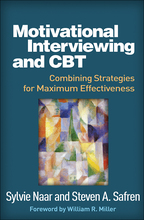Motivational Interviewing and CBT
Combining Strategies for Maximum Effectiveness
Sylvie Naar and Steven A. Safren
Foreword by William R. Miller
HardcoverPaperbacke-bookprint + e-book
Hardcover
orderAugust 23, 2017
ISBN 9781462531547
Price: $56.00 242 Pages
Size: 7" x 10"
Paperback
orderOctober 4, 2023
ISBN 9781462553778
Price: $37.00242 Pages
Size: 7" x 10"
Check out a special package offer including this title!

Sign up for emails on upcoming titles on Motivational Approaches (with special discounts)!
The reproducible materials can be downloaded and printed in PDF format.
The reproducible materials can be downloaded and printed in PDF format.
“This book integrates two excellent therapeutic approaches, motivational interviewing and CBT. It is easy to read and very practical, containing handouts that can be used with clients. This is an excellent resource for clinicians.”

—Doody's Review Service
“With this book, the integration of MI and CBT takes a leap forward. Behavior therapists have, I believe, paid far too little attention to the substantial impact of interpersonal skills and the therapeutic relationship in shaping treatment engagement, retention, adherence, and outcome….Person-centered advocates could, in turn, be faulted for paying too little attention to empirical science in recent decades….Perhaps MI and CBT are like oil and water. My junior chemistry project in high school was a study of emulsifying agents that make it possible to blend oil and water. It was a portent of things to come. This book is an emulsifier.”

—from the Foreword by William R. Miller, PhD, Emeritus Distinguished Professor of Psychology and Psychiatry, The University of New Mexico; codeveloper of MI
“An excellent resource. Rightly noting that CBT is hard work, the authors provide concrete strategies to capitalize on clients' own reasons for changing, while also avoiding the power struggles that can arise. As a clinical supervisor, I will recommend this book to my trainees as essential reading.”

—Shannon Sauer-Zavala, PhD, Center for Anxiety and Related Disorders and Department of Psychological and Brain Sciences, Boston University
“This clear, concise, practical guide arms the clinician with the background required to intelligently integrate MI principles into a CBT formulation and apply MI techniques alongside CBT techniques in treatment. The authors have significant expertise, which they share in a highly readable, usable format. The book is filled with helpful illustrative examples and guides the reader through the steps without being overwhelming. A 'must have' for any clinician who wishes to apply MI in the context of CBT.”

—Christine Purdon, PhD, CPsych, Professor and Director of Clinical Training, Department of Psychology, University of Waterloo, Canada
“Integrating MI into CBT is one of the most exciting and promising areas for improving the treatment of psychological disorders, but answers to questions of 'How?', 'When?', and 'How much?' were difficult to find until now. Naar and Safren present know-how and guidance to help the clinician conceptualize and effectively work with real-world clients who are struggling with competing motivations and fluctuating ambivalence and commitment. Packed with essential learning activities and reproducible tools, this book is an essential contribution to any mental health practitioner’s library. I will be recommending it as a text for our introductory doctoral-level 'how to do psychotherapy' unit or one of our more specialized advanced CBT units.”

—Peter J. Norton, PhD, Cairnmillar Institute, Melbourne, Australia
“This is a unique contribution to the literature on CBT training and practice. There are excellent clinical examples and exercises targeting collaborative communication that would be extremely useful for instructors to review with early-career clinicians. The text addresses conflicts between CBT and MI and suggests ways to resolve them. The guidelines and activities it gives practitioners and trainees are accessible and clear.”

—Donna M. Sudak, MD, Department of Psychiatry, Drexel University
—Doody's Review Service
“With this book, the integration of MI and CBT takes a leap forward. Behavior therapists have, I believe, paid far too little attention to the substantial impact of interpersonal skills and the therapeutic relationship in shaping treatment engagement, retention, adherence, and outcome….Person-centered advocates could, in turn, be faulted for paying too little attention to empirical science in recent decades….Perhaps MI and CBT are like oil and water. My junior chemistry project in high school was a study of emulsifying agents that make it possible to blend oil and water. It was a portent of things to come. This book is an emulsifier.”
—from the Foreword by William R. Miller, PhD, Emeritus Distinguished Professor of Psychology and Psychiatry, The University of New Mexico; codeveloper of MI
“An excellent resource. Rightly noting that CBT is hard work, the authors provide concrete strategies to capitalize on clients' own reasons for changing, while also avoiding the power struggles that can arise. As a clinical supervisor, I will recommend this book to my trainees as essential reading.”
—Shannon Sauer-Zavala, PhD, Center for Anxiety and Related Disorders and Department of Psychological and Brain Sciences, Boston University
“This clear, concise, practical guide arms the clinician with the background required to intelligently integrate MI principles into a CBT formulation and apply MI techniques alongside CBT techniques in treatment. The authors have significant expertise, which they share in a highly readable, usable format. The book is filled with helpful illustrative examples and guides the reader through the steps without being overwhelming. A 'must have' for any clinician who wishes to apply MI in the context of CBT.”
—Christine Purdon, PhD, CPsych, Professor and Director of Clinical Training, Department of Psychology, University of Waterloo, Canada
“Integrating MI into CBT is one of the most exciting and promising areas for improving the treatment of psychological disorders, but answers to questions of 'How?', 'When?', and 'How much?' were difficult to find until now. Naar and Safren present know-how and guidance to help the clinician conceptualize and effectively work with real-world clients who are struggling with competing motivations and fluctuating ambivalence and commitment. Packed with essential learning activities and reproducible tools, this book is an essential contribution to any mental health practitioner’s library. I will be recommending it as a text for our introductory doctoral-level 'how to do psychotherapy' unit or one of our more specialized advanced CBT units.”
—Peter J. Norton, PhD, Cairnmillar Institute, Melbourne, Australia
“This is a unique contribution to the literature on CBT training and practice. There are excellent clinical examples and exercises targeting collaborative communication that would be extremely useful for instructors to review with early-career clinicians. The text addresses conflicts between CBT and MI and suggests ways to resolve them. The guidelines and activities it gives practitioners and trainees are accessible and clear.”
—Donna M. Sudak, MD, Department of Psychiatry, Drexel University



